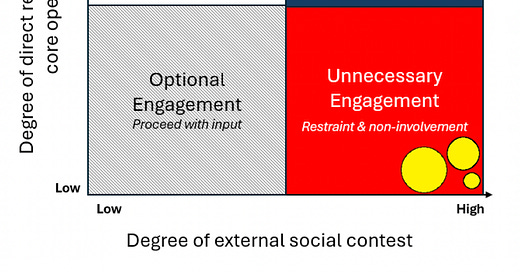Navigating a Polarized World
A Framework and Recommendations for Corporate Sociopolitical Controversies
There are legitimate and long-standing questions about business engagement with social and political issues. On the one hand, there is the broad expectation that businesses ought to engage with matters of public interest. On the other hand, there is concern when companies engage in social and political issues in the absence of broad social consensus.
Busch School Research Associate Patrick Langrell presents a practical way of navigating contested social and hyperpolitical environments with positive outcomes for employees, institutions, and society.
In this white paper, Langrell provides an overview of corporate sociopolitical controversies, beginning with a brief typology of contested issues involved and a timeline as to how controversies over corporate engagement with these issues often unfold. It summarizes the resistance companies face when they respond by taking public stances and provides a framework for better anticipating risks and distinguishing different types of corporate engagement. It concludes with starting points for a new governance approach that people on either side of contested issues ought to be able to accept.
Langrell proposes a framework and recommendations for addressing corporate sociopolitical risk. The common elements of corporate sociopolitical controversies are represented on a heat map with social and political issues along the axes of contest and relevance, with the employee dimension represented by size.
To avoid controversy, companies might consider whether and how to engage by assessing the level of external social contest against its direct relevance to the company’s core business.
I hope this article will help to spur renewed reflection about the possibility of working well with those with whom we disagree, and renewed hope in the possibility of living well together.
Read the full paper here.
Patrick Langrell has extensive experience in Australia, USA, UK and the EU in conceiving, directing and overseeing a wide range of organization-wide strategies and projects, external partnerships, and public programming in ethics, politics and corporate affairs. Together with his philosophical / ethical background and close working relationships with global business leaders, politicians, religious and civic figures – across the political and ideological spectrum – he is consulted on complex issues at the intersection of business, politics, and society.




